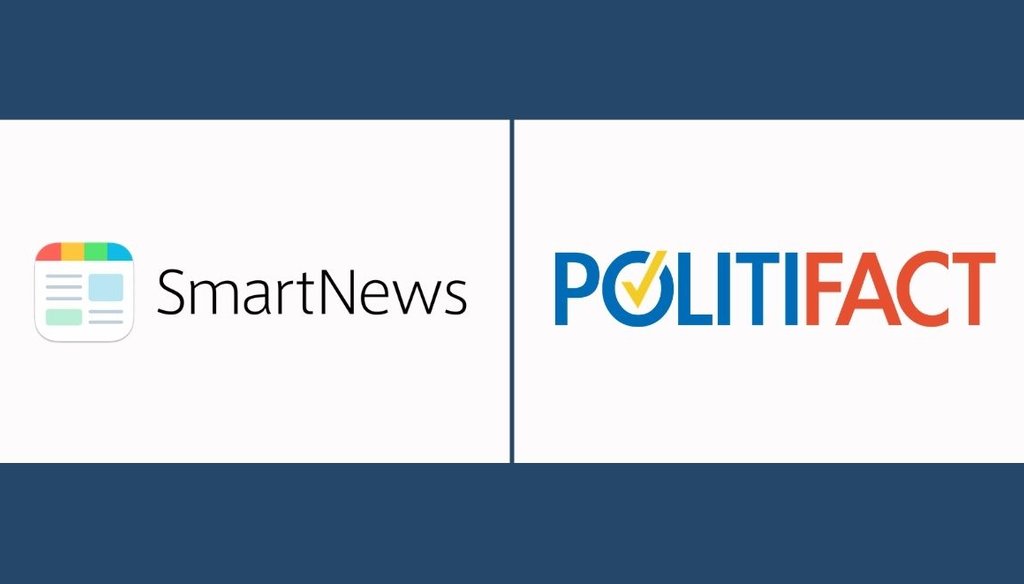Get PolitiFact in your inbox.

If Your Time is short
- PolitiFact now has its own channel on SmartNews, a news app for your phone.
- Rich Jaroslovky of Smart News said the platform stands out by bringing readers a mix of news that aims to combat filter bubbles and give people a range of perspectives on the issues of the day.
- SmartNews believes that presenting a wider range of content actually keeps people more engaged over time.
What is SmartNews? News that makes you smarter? Perhaps. It’s also an app on your phone with section tabs such as Politics, Business and Tech and has 20+ million active global users per month.
You can now add the PolitiFact channel to your SmartNews app on your phone or tablet, and see all of our latest fact-checks. You can select the option to add the PolitiFact channel under the U.S. news tab.
Here's how to download the app on your device:
In light of SmartNews’ new partnership with PolitiFact, Audience Engagement Editor Josie Hollingsworth sat down with Vice President for Content & Chief Journalist of SmartNews Rich Jaroslovsky to discuss some of the challenges facing online news publishers in the current media landscape.
I’ve read that SmartNews is trying to "burst filter bubbles." We know that’s a big problem, particularly on social media. Tell me how you try to do that?
What we call our News From All Sides slider is a feature that allows you not just to read the highlighted story, but basically to get a range of perspectives from different publishers across the political spectrum. And we also optimize our algorithms, among other things for diversity, so that you are almost guaranteed to see content from perspectives different than your own. So all those things, we think by exposing people to different perspectives, that gives them an appreciation of the range of opinion and the range of perspectives that are available on any given issue.
You’ve made a push to have news organizations publish natively on SmartNews. That’s obviously better for a SmartNews user, but how is it working for publishers? Is it driving more traffic? What results are you seeing?
I think we're seeing a lot of positive results. Among other things, it's allowing us to provide the publisher with additional monetization opportunities, the opportunity to get to place their own advertising, on the SmartView version of their stories. It allows them to get paid when the content appears natively. And it's also a better experience for our users because they're not having to fight through a bunch of ads on a mobile website. It's a much cleaner experience for our users. So from our standpoint, we regard it as kind of a win-win, it's better for the user, and a much better experience. And, it works for the publishers as well.
You founded the Online News Association in 1999. That feels like forever ago in the online news world. I’m curious what the motivation was at the beginning.
Well, there's a highfalutin motivation and then there's a real world one. The highfalutin one was in the early days of the web, it was sort of the Wild West. And, we wanted an organization that would uphold the traditional values of journalism, while at the same time being willing to embrace the new technologies that were coming along and continue to come along. So that's kind of a highfalutin motivation.
The other motivation, which is equally true, is that I got tired of going out to lunch with peers, from other news organizations, sitting around and spending the entire lunch complaining to each other about, you know, "other people in the company don't get it, they don't understand what we're doing." Our craft of journalism is full of world class complainers. And, it's possible that I'm one of them.
So I figured out, rather than just sitting around on an ad hoc basis, complaining to each other about these issues, we should have an organization where we could formally sit around and complain to each other about these problems, and maybe do something about them. So that was kind of the serious motivation for ONA.
Back then, news online was something journalists did … often for free, and often without any thought. Today, it’s the core of a lot of our business. For PolitiFact, it’s the only way we publish. Journalists have so often been slow to react or behind, are we starting to get past that? Are you hopeful or worried about the future of online news?
It depends on the day. I generally am an optimist. And, and generally speaking, I'm hopeful about the future of online news because of the vast possibilities that it presents. And at the same time, the challenge to business models, and creating the resources that are necessary to embrace those possibilities, as well as the smarts and intelligence to embrace those possibilities and to execute? Well, sometimes the business has been very slow to react, especially in those early days.
I also want to ask about trust in journalism. It’s certainly under threat, particularly online. What are we doing wrong? How are we failing as an industry?
There are larger forces at work in terms of the sort of fragmentation of the mass audience that existed when I was starting out in journalism, into a much more niche audience. When I was first starting out in journalism, there was just this handful of outlets that you would go to to be informed. And first with the arrival of cable TV, and then with the arrival of the web, the number of sources accessible to you just exploded.
And, in some ways, that was a good thing because it provided a much broader and more diverse range of opinion and perspective. But in other ways, it was a bad thing because when you have assembled a mass audience and when you needed that mass audience, in order to sustain your business, it tended to drive media towards the middle.
That mass audience fragmented, however, and many organizations replaced the strategy of assembling and appealing to a mass audience with a strategy of focusing on a specific niche more intensively. And that really led to a lot of what we see today where you have liberals getting news from liberal sources, conservatives getting news from conservative sources. There aren't that many places where a broad audience can go to get the news. And in some ways, that's kind of what we're trying to recreate in SmartNews.
The interesting thing in SmartNews’ case is we don't buy into that. Users will see a broader range of content. And the fact that our engagement metrics are so high, are actually I believe, two sides of the same coin. Because when all you see is stuff that "you already know," it's like a sugar rush. But, over time, that becomes boring, because you're never exposed to different points of view, you're never exposed to unexpected things. A wider range of content is a much more powerful motivator to keep people engaged than just feeding them over and over again the same content in different packages.
Are SmartNews’ publishers vetted for trustworthiness? Is there anything you are doing to try to keep misinformation off the app?
Yes, in terms of making the decision about whether a publisher can have their content on our app. Some of our guidelines are really basic. For example: Does the publisher have an "About Us" that gives you information about who owns them? If they are purporting to be a local news site, do they actually have a presence in the area that they're supposedly writing about?
If we can't assure the provenance of a publisher, that publisher doesn't appear on SmartNews. It's always going to be a game of whack a mole. But we've been very proud of our ability to keep fake news off of SmartNews, and that's an attitude. And it's one of the reasons why I came to work for SmartNews in the first place.
I think we hear a lot from readers that they’re not sure what source to trust — or what information to believe. As an online news pro, what tips and strategies do you use to begin to evaluate whether or not to trust a piece of news you see online?
One of my pet rules is that bad information devalues good information. When people don't know what to believe, they tend to believe everything less.
I obviously look at the provenance of the article: Do I know this news organization’s values? And do I trust them to be trying to do the right thing?
But I also look at whether this is a polemical argument. Is there counter evidence reflected here? Is there evidence that this author and this publisher have considered the facts that might be on the other side, and are making an effort to present them fairly?
Rich Jaroslovsky is Vice President for Content & Chief Journalist of SmartNews. He spent more than two decades as a writer and editor for the Wall Street Journal, including serving as its White House correspondent and National Political Editor. Starting in 1994, he was the founding Managing Editor of The Wall Street Journal Online (WSJ.com), and founded and was the first President of the Online News Association. He later joined Bloomberg News, where he was Executive Editor in charge of its worldwide economic and governmental news, and a nationally known columnist and commentator on personal technology.
















